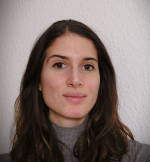1. Technical University of Denmark
ESR5 Ema Svetlicic
e-mail: emasve@biosustain.dtu.dk

Ema obtained her master´s degree in Molecular Biotechnology from the Faculty of Food Technology and Biotechnology at University of Zagreb, Croatia. Her master´s thesis concerned metaproteomic and metagenomic studies of gut microbiota. Since then, she has been working with mass spectrometry-based methods to identify and characterize microorganisms. Ema joined the group of Professor Ivan Mijakovic at DTU Biosustain in 2021 to pursue her PhD in the discovery of diagnostic biomarkers of pathogenic bacteria. In her project she will model the host-pathogen interaction and then use mass spectrometry and bioinformatics to unravel potential pathogen biomarkers.
Project title: Proteome dynamics of bacterial pathogens during infection: biomarkers for diagnostics
The PhD project is part of a work package focused on identifying surface biomarkers of various clinically relevant pathogens which will be exploited for development of novel biosensors. Pathogenic bacteria will be grown in contact with human cell lines relevant for the infection. Following the infection modeling, mass spectrometry-based quantitative proteomics will be used in conjunction with surface shaving to detect differentially expressed proteins on the bacterial surface.
ESR7 Mohammed Ghalib Enayathullah
e-mail: mghalib@biosustain.dtu.dk

Ghalib graduated with an Integrated Master’s Degree in Biotechnology (2019) from SASTRA University, India. For his master thesis, Ghalib worked under the guidance of Dr. Gautham B.J., on developing a cost-effective method for lactic-acid production and its techno-economical understanding using simulations. In 2019, he joined Dr. Idris in CSIR-CCMB as a trainee to gain expertise in molecular biology techniques and because he wanted to delve into infection biology. As the COVID-19 hit India in 2020, Ghalib joined a national level Antiviral Drug Screening project with Dr. Kiran Kumar in CSIR-CCMB, gaining extensive experience in virology, cell culture, drug screening, molecular biology for 2 years and he developed a pipeline of proteomics out of self-interest. In 2022, he joined as a PhD student in Technical University of Denmark in Prof. Ivan Mijakovic’s Lab to continue pursuing and widen his understanding of infections as he gains proficiency. Like his mentors he wishes to educate himself and as many researchers and people as possible, but in understanding infection mechanisms to be able to fight against mutating persisters.
Project title: Proteome dynamics of bacterial pathogens during infection - New Drug Targets
His project aims at identifying differentially expressed and phosphorylated proteins in bacterial pathogens during an infection, and to validate these as potential new targets for antibiotics. His focus is built on the interaction of infectious pathogenic bacteria on a host system (preferentially human cell lines) and their (phosphor-)proteomes analyzed by quantitative MS proteomics approaches (SILAC, iBAC). Strains will be genetically engineered in which candidate proteins will be either inactivated or transformed into phospho-mimetic or phospho-ablative mutants. The mutant strains will be tested in virulence assays. In cases where impact on virulence will be proven, he will follow up with genetic and biochemical characterization of participation of these proteins in the infection process. He believes he will generate a list of differentially regulated proteins confirmed to be involved in infection – to be used as targets for antibiotics development
ESR13 Mukil Madhusudanan
e-mail: mukmad@biosustain.dtu.dk

Mukil is from New Delhi, India and has a bachelor’s and master’s degree in Nanotechnology from Amity University Noida, India. He is fascinated by the potential of nanotechnology and endeavours to make a tangible contribution in the scientific evolution of this field. During his master’s thesis, he worked on the development of biodegradable block-copolymer based drug delivery system for controlled and targeted delivery of hydrophobic anticancer drug, Bortezomib. He then worked on a two-year project to enhance uptake and bioavailability of zinc micronutrient in cereal crops, employing engineered nanoparticles. He has joined DTU Biosustain as a PhD student under the supervision of Prof. Ivan Mijakovic wherein he aims to develop hybrid antimicrobial nanostructures to overcome antibiotics resistance and aid biofilm inhibition.
Project Title: Conjugation of Graphene-Coated Nanoparticles & Antibiotics: Nano- Weapon Against Biofilms
Mukil will engineer green synthesized antimicrobial magnetic nanoparticles, spiked with antibacterial graphene coating which will in turn be loaded with antibiotics to be able to physically penetrate deep into bacterial biofilms, where it will ensure steady and sustained release of antibiotics in the otherwise protected heart of the biofilm.
2. Chalmers University of Technology
ESR2 Munis Khan
e-mail: munis@chalmers.se

He completed his bachelor’s degree in Electronics and Communications Engineering from SMVD University, India in 2015. In 2015 he enrolled for a master’s degree at TU Chemnitz, Germany with major focus on solid state physics. The main research focus during his masters was spectroscopic investigation of Graphene and it’s derivatives with his master thesis focused on solid-state graphene-based supercapacitor. After finishing his masters he worked for 2 years in a semiconductor company in Austria (EV Group) working on nano-fabrication techniques to realize photonic devices and optical waveguides using nano-imprint lithography for AR/VR applications. Since June 2021 he have joined Quantum device physics laboratory at Chalmers University to pursue his PhD on below mentioned topic under the supervision of Prof. August Yurgens.
Project Title: Biosensors based on CVD graphene and non-covalent functionalization.
The objectives of his project are to develop cost effective platform for scalable fabrication of graphene biosensors with high specificity and sensitivity. Large-area graphene grown by CVD method will be transferred from the copper catalyst to a plastic carrier and patterned into multiple individual devices. The transfer process will include environmentally friendly technologies allowing for multiple use of the catalyst. Printed electrodes using carbon - or graphene inks will be employed to contact the devices, again avoiding heavy metals in the devices. Device clusters, up to six graphene sensor elements on a single carrier will be functionalized individually, to be able to detect several types of pathogens in a single analyte droplet placed on the sensor. It is expected that a non-covalent functionalization will preserve high sensitivity of graphene to adsorbates.
ESR3 Flavia Ferrara
e-mail: flaviaf@chalmers.se

Flavia Ferrara carried out her studies at La Sapienza University, in Rome, obtaining her bachelor-degree in Chemistry in October 2018. Her bachelor project involved library research in the field of supramolecular chemistry, more specifically on the functionalization of non-activated C-H bonds. Afterwards, she pursued a Master’s degree in Organic and Biomolecular chemistry, graduating in January 2021. During the Master, funded by an Erasmus+ scholarship, she carried out a six months thesis traineeship at the Organic Chemistry department of Stockholm University in the group of Prof. Pher Andersson. The main interest of the group was the iridium-catalyzed asymmetric hydrogenation of olefins and her project focused on the hydrogenation of in situ generated cyclic enamides, using these tandem reactions to develop a more sustainable synthetic method to access biologically relevant molecules as products.
Project title: Functionalizing graphene sensors with receptors for diagnostic biomarkers for infection
The aim of the project is the preparation of synthetic receptors and the evaluation of their binding properties to diagnostic biomarker compounds, using organic synthesis and characterization of organic compounds as tools to attain this goal. In collaboration with another ESR in the project, she will functionalize graphene with synthetic receptors and evaluate the properties of the produced graphene devices as biosensors for infection.
ESR14 Hengzhi Ruan
e-mail: hengzhi@chalmers.se

Hengzhi Ruan carries out his researches at Chalmers (SE) in the lab of Rheology and Processing of Soft Matter supervised by Prof. Roland Kádár whose research group studies tailoring multifunctional properties in nanostructured materials - focused on the process structuring of polymer nanocomposites based on graphene. Before joining the research group, Hengzhi obtained his bachelor degree and master degree from the University of Science and Technology Liaoning (CN) and the East China University of Science and Technology (CN) with a national award winning. During his master study, his academic interests are in the area advanced functional material science to help address key challenges faced by the engineering world, such as wearable biosensors for personalized medicine, antifreeze artificial muscle and antibacterial hydrogel materials.
Project title: Commercializing a new class of antibacterial surfaces: polymer graphene nanocomposites
Infectious diseases are predicted to rise in the next year due to antibiotic resistance. As a result, there is a pressing need for disruptive technologies to tackle this medical challenge. The EU-funded PEST-BIN project bridges academia and industry to deliver new diagnostics tools that can detect infection with the accuracy and speed required in a clinical setting. Proteomics analysis with the help of artificial intelligence will provide insight into the mechanisms of bacterial infection and unveil new targets for antibiotic development. Moreover, partners will employ nanotechnology loaded with antibiotics to tackle bacterial biofilms, an inherently difficult structure to penetrate with drugs.
3. Rudjer Boskovic Institute
ESR12 Anja Tušar
e-mail: Anja.Tusar@irb.hr

Anja Tušar obtained BSc in Microbiology and MSc in Biotechnology at the Biotechnical Faculty, University of Ljubljana, Slovenia. She acquired additional experiences in the field of Microbiology during two Erasmus internships (Max-Planck Institute, Germany and Technical University of Denmark) and ASEF fellowship (University of Queensland, Australia). During her MSc research at the National Institute of Chemistry, Slovenia (2017-2019) and the internship with Kobe’s research team at the University of Queensland (2019), she was discovering diverse molecular cloning methods, protein production in Escherichia coli, protein isolation, and protein characterization. At the Technical University of Denmark (2018), she was working with Bacillus subtilis, one of the model organisms for biofilm formation. The research included another process that Bacillus subtilis undergoes, sporulation. Anja Tušar is now a PhD fellow at the Institute Ruđer Boškovič, Croatia and is carrying out her research project under the supervision of Prof. Dr. Tomislav Domazet Lošo.
Project title: Evolutionary patterns in the biofilms of pathogenic bacteria.
The aim of the project is to establish in vitro biofilm models for pathogenic bacteria and to determine their evolutionary patterns. We will pursue to detect evolutionary imprints in biofilm growth of medically important pathogenic bacteria by studying their transcriptome, proteome, and phosphoproteome. As a starting point, we will estimate the phylogenetic age of all genes in the genomes of studied pathogens by phylostratigraphic approach and then link this information to the experimentally collected omics data. Our goal is to identify candidate genes that play a critical role in medical outcomes related to biofilm formation under different environmental factors. Experiments and analyses will be carried out at the Ruđer Bošković Institute with secondments at the Faculty of Science, University of Zagreb, and at the Technical University of Denmark.
4. Goteborg University/Sahlgrenska University Hospital
ESR1 Leonarda Achá Alarcón
e-mail: leonarda.acha.alarcon@gu.se

Leonarda is a biochemist from Bolivia, educated at the Universidad Privada del Valle, where she received training with a clinical focus. During her Master’s Studies in Biological and Biomedical Sciences (Universidad Mayor de San Andrés) she worked on the development of a home-made ELISA for the detection of group A rotavirus in fecal samples of children and domestic South American camelids under the supervision of Professors Volga Iñiguez and Ewald Beck. In 2019 Leonarda did an internship at CCUG with Edward Moore’s group, Sweden, where she received training in bacterial genomics. In 2020 and 2021 she worked at Instituto de Biologia Molecular y Biotecnologia (IBMB-UMSA) as part of the group who had identified the SASRS-COV2 Gamma variant circulating in Bolivia. Leonarda has joined PEST-BIN project as a Ph.D. student under the supervision of Docent Roger Karlsson to work on the identification of biomarkers from surface proteins of clinically relevant pathogens enlisted as prioritized antibiotic resistant bacteria by the WHO.
Project title: Discovery of Biomarkers for infectious disease pathogens.
The project is focused on the identification and discovery of biomarkers present in bacterial pathogens resistant to antibiotics, identified to be a threat by the WHO. Representative strains from the selected species will be investigated through genomics. Subsequently, strains will be investigated by proteomics and mass spectrometry, with a special focus on surface proteins, by performing surface shaving of intact bacterial cells, enabled by the lipid-based protein immobilization (LPI) methodology. The discovered peptide/protein biomarkers will then be used for generating sensors to detect the bacteria.
5. University of the Balearic Islands
ESR11 José Maria Serpa Laço
e-mail: j.serpa@uib.es

José Maria Serpa Laço holds a BSc in Biology and a MSc in Biochemistry from the University of Évora (Portugal) and University of Coimbra (Portugal), respectively. During his master’s degree, he had the opportunity to develop his master thesis at Microlab from the University of Aveiro (Portugal), entitled “Rivers as routes for the spread of antibiotic resistance: role of anthropogenic pressures and risks to human health”. In this work, he aimed to evaluate cefotaxime resistant Enterobacteriaceae in the Lis River (Leiria, Portugal) as well as the variety of blaCTX-M genes and their genomic context. José Maria is now a PhD student in the PEST-BIN project and is carrying out his research project at the University of the Balearic Islands under the supervision of Professor Margarita Gomila, with secondments at the University of Gothenburg, under the supervision of Docent Roger Karlsson, and Nanoxis Consulting AB, under the supervision of Dr Anders Karlsson.
Project Title: Role of clinical environment as a reservoir of nosocomial infections
The aim of the project will be to identify the microbial composition of clinical environments, characterize the mobile genetic elements associated to virulence and antibiotic resistance as well as to detect new antibiotic resistance genes. The project will provide deep insight into the genomic potential for the metabolic processes, evolutionary relationships, epidemiology and factor associated with the mobilomes and resistomes of bacterial pathogens.
6. NAICONS
ESR15 Thomas Vernay
e-mail: tvernay@naicons.com

Thomas Vernay is a french “Ecole de l’Inserm” PharmD/PhD fellow. He graduated from both Institut Pasteur, Paris in 2018 (MSc in Microbiology) and University of Rennes 1 in 2021 (PharmD). His past works mostly involved the study of host-pathogen relationship with an emphasis on gut microbiota and nutrition (UMR1241 NuMeCan, Rennes), genital innate immunity (Institut Pasteur, Paris) and bacterial intracellular persistance (U1230 BRM, Rennes). He also have worked in translational research on pharmacology of antibiotics (U1070 Phar, Poitiers) and vaccination remediation (CHU Pontchaillou, Rennes). He is currently working as a PhD student at Naicons Srl, Milano under the supervision of Dr. Stefano Donadio and Pr. Cristina Airoldi from the University of Milano-Bicocca.
Project title : Discovery of novel antibiotics from microbes
The aim of his project is to accelerate the discovery of new antibiotics, by characterizing over 8000 Actinomycetes strains from the Naicons library by metabolomic profiling. Two approaches, using molecular networking and paired -omics tools, will be considered : identification of “talented” strains & systematic analysis of a “rare” genus. Promising metabolites with antibacterial properties will be targeted for purification, structural elucidation and characterization.
7. AltraBio
ESR6 Sara Ribeiro
e-mail: sara.ribeiro@altrabio.com

Sara holds a Bsc degree in Biology from the Faculty of Sciences of the University of Porto (FCUP), a specialization course in Biochemistry for Health from Escola Superior de Saude do Porto (ESS), and a Msc degree in Bioinformatics and computational biology from FCUP. In the final phase of this master’s degree she started to work for i3s/IPATIMUP on a research project called ‘Biostroke’. This project focused on detecting important biomarkers for the proper diagnosis and prognosis of acute ischemic stroke. After performing both proteomics and transcriptomics data analysis from mouse models and human patients, several promising biomarkers were unravelled.
Title of the project: Large scale data analysis towards uncovering microbial Achilles heel
The main focus of Sara’s project is to develop analytical pipelines adapted to the analysis and integration of the data derived from the omics studies performed by the consortium. These analytical pipelines will help to detect promising biomarkers to be integrated in the biosensors for a proper diagnostics, and to elucidate the mechanisms of bacterial infection. She will also implement the developed methods to analyze and integrate the different omics data generated by the consortium and provide valuable correlation and correction of inferred models.
8. CNRS - French National Centre for Scientific Research
ESR8 Margaux Demuysere
e-mail: margaux.demuysere@ibcp.fr

Margaux Demuysere is a PhD candidate at the CNRS under the supervision of Dr. Christophe Grangeasse, whose research group studies the regulation of S. pneumoniae cell cycle. Before moving to Lyon (FR), she graduated from a BSc and a MSc in Biomedical Sciences, at the University of Namur (BE) and Utrecht university (NL), respectively. During her master, she specialized in microbiology and immunology. She will now benefit from the expertise of Dr. Grangeasse’s team in biochemistry, bacterial genetics, proteomics and cell imaging to study the cell cycle of S. pneumoniae during competence, a genetic differentiation program recognized as the leading force of bacterial adaptation to stresses such as antibiotic treatments.
Project Title: Coordination and regulation by phosphorylation of genetic transformation and cell division in Streptococcus pneumoniae (the pneumococcus)
Despite the availability of vaccines and antibiotic treatments, efforts to control Streptococcus pneumoniae infection are hampered by the great genomic plasticity of S. pneumoniae. Indeed, S. pneumoniae is able to undergo natural transformation, a mechanism allowing the acquisition of new traits, including antibiotic resistance genes, through the uptake and chromosomal integration of exogenous DNA. Natural transformation is dependent on the induction of competence, a genetic program triggered by various environmental stresses, including antibiotic treatments. The objective of this project is to refine the regulatory networks at play during the induction of competence by using comparative phosphoproteomics, as well as investigate the coordination between transformation and cell division. Ultimately, this could lead to the development of innovative strategies to tackle antibiotic resistance.
9. University of Tübingen
ESR9 Payal Nashier
e-mail: payal.nashier@uni-tuebingen.de

Payal Nashier holds a Bachelor’s and Master’s degree in Zoology from Miranda House, University of Delhi, India. During her graduation, she has done a number of internships including one at IIT Guwahati, India awarded by Indian Academy of Sciences, Indian National Science Academy and National Academy of Sciences India. After completing her master’s in 2019, she joined a research lab as Junior Research Fellow (JRF) where she worked on deciphering the role of Serine/Threonine phosphorylation in Bacillus anthracis for developing novel anthrax spore vaccine under the supervision of Prof. Yogendra Singh at Department of Zoology, University of Delhi, India. Her work there also resulted in a publication in Journal of Bacteriology in May 2021. Payal is now a PhD student in the PEST-BIN project under the supervision of Prof. Boris Macek at the University of Tübingen, Germany. Her project focuses on the studying the effect of kinases at proteome and phosphoproteome levels to find out the underlying pathways regulated by them.
Project Title: Regulation of bacterial persistence and metabolism by Serine/Threonine kinases (STK).
The aim of her project is to get new insights into the role of STK in regulating bacterial persistence, metabolism, dormancy and other cellular pathways as well as expanding the applicability of MS-based quantitative proteomics to single cell level by using established (phospho)proteomics and microbiology approaches to characterize several bacterial STK and, development of sample preparation methods that increase sensitivity of (phospho)proteomics measurements.
10. Clinical Microbiomics A/S
ESR10 Sara Rodrigues Pita
e-mail: sarap@clinical-microbiomics.com

Sara Pita is a PhD student at Clinical Microbiomics (CM) under the primary supervision of Henrik Bjørn Nielsen, PhD. CM is a research contract organisation (CRO) focusing on microbiome analyses from DNA extraction and taxonomic profiling to linking the microbiome to clinical outcomes. She’ll be working on identifying and prioritizing microbiome-based targets by leveraging metagenomic datasets. Prior to commencing this PhD, she completed an MSc in Quantitative Genetics & Genome Analysis at the University of Edinburgh. This followed by a 2-year long computational research assistant post within an early cancer detection lab. Her work encompassed erecting bioinformatic pipelines for methylation sequencing processing and applying methods to identify differentially methylated loci between tumor and benign tissue.
Project Title: Phenotype predictions using machine learning and ultra-high resolution microbiomics
The project aims to utilize ultra-high resolution – strain-level base-pair resolution - microbiomics data to predict microbiome characteristics (e.g. alpha diversity) and host phenotypes (e.g. Infection absence or presence). Strain-level metagenomic analyses enable (1) the dissection of detailed functional information from the gut microbiome and (2) pinpointing interactions amongst gut microbial strains. Particularly interesting in the context of infection, would be identifying bacterial strains that arrest pathogen colonization.
11. INRAE: National Research Institute for Agriculture, Food and Environment
ESR4 Lydia Palaiodimou
e-mail: lydia.palaiodimou@inrae.fr

Lydia Palaiodimou has graduated with a BSc Cell and Molecular Biology from Newcastle University (UK) in June 2019. She also holds an MSc Microbiology from Northumbria University (UK) from which she graduated in January 2021. During her MSc thesis, under the supervision of Dr Edward Fox, she addressed the mechanisms of persistence of Listeria species in the food processing environments by using a comparative genomics approach. This work resulted in a publication in the Journal of Applied Microbiology on March 2021. On May 2021, Lydia was recruited as a PhD student at the National Institute of Agricultural Research and Environment (INRAE, Micalis Institute) in affiliation with the University of Paris-Saclay (FR). She is currently working under the supervision of Dr Alessandro Pagliuso and Dr Celine Henry. Her project focuses on the proteomic analysis of L. monocytogenes in the VBNC state both in vitro and in vivo.
Project Title: The Listeria monocytogenes proteomic switch upon entry into the viable but nonculturable (VBNC) state in vitro and in human cells
The bacterial pathogen Listeria monocytogenes is the agent of listeriosis, one of the most dangerous food-borne diseases. Listeria contamination is essentially detected by classical microbiology tests based on enrichment steps, thus relying on the cultivability of bacteria. However, both extracellular and intracellular Listeria are able to enter a dormant state called VBNC, characterized by loss of bacterial growth in conventional culturing media. Although undetectable, VBNC bacteria maintain their pathogenic potential, thus representing a risk for human and animal health. By applying cutting edge techniques (RNA sequencing and quantitative proteomics), the project aims at defining the physiological markers of VBNC Listeria and providing fundamental knowledge on asymptomatic bacterial infections. This One Health project also intends to develop tools for the detection of silent VBNC Listeria in food, human and animal samples.

